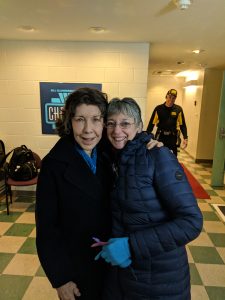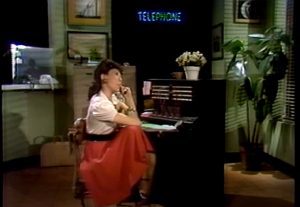I’m ready to get my copy of Writing Practice for Technical Writers!
One of my favorite actors is Lily Tomlin. She can literally have you laughing
so hard, you’re crying. Yet,  oftentimes what she says makes sense. I had the pleasure of meeting her in person years ago at one of her shows.
oftentimes what she says makes sense. I had the pleasure of meeting her in person years ago at one of her shows.
Below is my take on one of her most famous skits from Rowan and Martin’s Laugh-in, an American sketch comedy television program that ran for 140 episodes from January 22, 1968, to March 12, 1973.
In this skit Lily Tomlin plays her most famous role on Laugh-in as Ernestine, the Telephone Operator.
Imagine this – a woman with her hair pulled back, red lipstick and a distinctive nasal tone. The audience could only hear her side of the conversation, and her famous snort.
The skit would always open with the phone ringing, and Lily Tomlin (aka Ernestine) answering it like this:

“Operator – snort snort
You want to speak to who?
No, sorry wrong number. No, I don’t know that person.
I’m hanging up now. No, no, no. I will not search for that person.
How are you spelling that? Stop! I don’t want to know.
You said what? Who? Oh! Why didn’t you say that earlier – hold please.” (Ernestine punches a button, transferring the caller to their requested party)
Cut to burly man in military uniform, picking up the phone –
“CIA – how may I help you? What? No you can’t make a dinner reservation here!
No ma’am. We don’t do take-out meals either. I’m sorry, Ma’am, who are you calling? The Culinary Institute of America? Ma’am, we’re the CIA – Central Intelligence Agency. We don’t provide meals to the public.”
This is what happens when you toss around acronyms that you know but the client may not.
Even worse, when multiple departments within a company use the same acronym, even though they have different meanings. Although the language is the same, the meaning behind the acronyms may not be, and this causes confusion and frustration. Sigh!
Have you ever experienced this with the hiring manager?
I find people either know how to use acronyms or they don’t. Speaking in acronyms is common in the technical writing space, and they can be useful and necessary.
-> ➔ But – the problem is the inconsistency in how to use them. There doesn’t seem to be any standard which can make your writing look sloppy.
When it comes to acronyms, how do you use them so your client is clear on the exact meaning? More importantly, how do you write them in a way so that the end user understands the context and most accurate interpretation?
The best way I’ve found is to take your time, go through the documents you are working with and highlight every acronym you find. Create a word document or excel spreadsheet of every acronym you find to save you time later.
Make sure to stay consistent throughout the whole document. That means write out what an acronym means the first time you use it in that document.
Once you’ve done that, you can write the letters in parentheses after it. For example, Culinary Institute of America (CIA). Now you can use CIA throughout the remaining document and your readers will know that CIA stands for Culinary Institute of America.
You may have seen times where the acronym gets written first, then what it stands for. To know which one is correct for the company you are working with, check with your manager for a style guide and follow that.
Whatever way they use it, make sure all your documents are consistent throughout. If they don’t follow any style guides, use the meaning first with the acronym in parenthesis after.
Why you want to create an acronym glossary
Once you have a running list of acronyms used in a document, it makes sense to turn that into an acronym glossary.
This will:
- Help them write the doc more clearly (better understanding of the acronym for both the writer and the client) as a result, you will feel confident and have a good rep which can lead to more assignments and promotions.
- Create better documentation, which means you’ll get better gigs and higher pay because you are known as someone who can do the job without constant input
- Enable you to do the job faster and easier, which means you’ll make more money because of the volume of work you can do
- Foster a relationship of trust and confidence with the subject matter experts and managers, ensuring you are the go-to resource and highly valuable
What about you? What would it be like to be in constant demand and know that you are an integral part of a company’s team?
Do you find that you frequently feel like pulling your hair out when it comes to acronyms? 
If so, don’t feel bad, this is common. Just go back and read the story between Ernestine and the caller for confirmation.
So, now you know about the use of acronyms and how to impress your “boss”. What else can I say but TTYL! (Talk to you later!)
If you’re ready to improve your writing to increase your chances of getting interviews that will land you the job, enable you to confidently work with the subject matter experts, and do what you love to do all while getting well paid for it, then my workbook, Writing Practice for Technical Writers, is something you need!
Yes! I can’t wait to get better writing jobs and make more money!
This Do-it Yourself (DIY) workbook is a great way to give you the guidance you need, and at a pace and schedule that works for you. With 53 writing exercises, you’ll learn the most important skills you must have as a technical writer, as well as completing four writing samples that will give you the boost you need to get those job interviews and feel confident when answering questions in your interview!
Ready to get started? It’s fast and easy to get your own copy
and be on your way to better writing jobs and higher pay!
However, if you feel you may need an additional level of support, and prefer to work more intimately with my expert guidance, you can schedule a complimentary consultation with me.
In this call we discuss where you are in your technical writing journey, what you want to achieve, and see if it makes sense to work together.
I know the freedom and flexibility that comes with having a solid technical writing career. You can have that too, you just need to know how to stand out, get noticed and get the job offer on the first interview!!
I’m ready to get my copy of Writing Practice for Technical Writers!